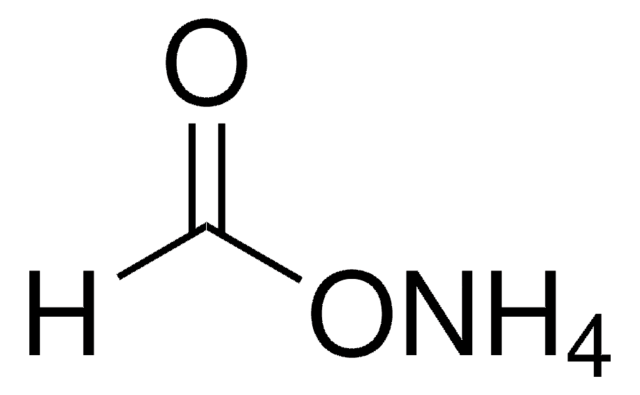23307-U
Colonna GC capillare SPB®-5
L × I.D. 50 m × 0.32 mm, df 5.00 μm
Sinonimo/i:
GC column, SPB-5, 5% diphenyl
Autenticatiper visualizzare i prezzi riservati alla tua organizzazione & contrattuali
About This Item
Codice UNSPSC:
41115710
eCl@ss:
32119290
NACRES:
SB.54
Prodotti consigliati
Materiali
fused silica
Livello qualitativo
agenzia
meets requirements for USP G27 and G36
Parametri
-60-300 °C temperature (isothermal or programmed)
Beta
16
df
5.00 μm
tecniche
gas chromatography (GC): suitable
Lungh. × D.I.
50 m × 0.32 mm
Gruppo funzionale matrice
Bonded; poly(5% diphenyl/95% dimethyl siloxane) phase
Tipo di colonna
capillary non-polar
Cerchi prodotti simili? Visita Guida al confronto tra prodotti
Categorie correlate
Descrizione generale
Applicazione: Questa colonna non polare per scopi generali offre principalmente un ordine di eluizione secondo il punto di ebollizione con un piccolo aumento di selettività, specialmente per i composti aromatici.
Codice USP: questa colonna soddisfa i requisiti USP G27 e G36.
Fase
Codice USP: questa colonna soddisfa i requisiti USP G27 e G36.
Fase
- Legata
- Poli (5% difenile/95% dimetilsilossano)
- ≤D. I. 0,32 mm, <2 μm: da -60 °C a 320 °C (isoterma o programmata)
- ≤D. I. 0,32 mm, ≥2 μm: da -60 °C a 300 °C (isoterma o programmata)
- ≥D. I. 0,53 mm, <2 μm: da -60 °C a 300 °C (isoterma) o 320 °C (programmata)
- ≥D. I. 0,53 mm, ≥2 μm: da -60 °C a 260 °C (isoterma) o 280 °C (programmata)
Applicazioni
SPB®-5 capillary GC column was suitable to investigate high recoveries of polycyclic aromatic hydrocarbons (PAHs) during preparative capillary gas chromatography-mass spectrometry. It may also be used for herbicide determination using In-tube Solid-phase microextraction (SPME).
Altre note
We offer a variety of chromatography accessories including analytical syringes
Note legali
SPB is a registered trademark of Merck KGaA, Darmstadt, Germany
Scegli una delle versioni più recenti:
Possiedi già questo prodotto?
I documenti relativi ai prodotti acquistati recentemente sono disponibili nell’Archivio dei documenti.
Manolis Mandalakis et al.
Journal of chromatography. A, 996(1-2), 163-172 (2003-07-02)
Operation parameters of a preparative capillary gas chromatography (pcGC) system were optimized to facilitate clean and efficient harvesting of individual polycyclic aromatic hydrocarbons (PAHs) for subsequent compound-specific radiocarbon analysis. For PAHs, the recommended optimized settings of the specially-designed pcGC cooled
L J Krutz et al.
Journal of chromatography. A, 999(1-2), 103-121 (2003-07-30)
Liquid-liquid extraction or solid-phase extraction followed by gas chromatography (GC) or high-performance liquid chromatography are traditional herbicide residue determination methods for environmental samples. Solid-phase microextraction (SPME) is a solventless, fast, and sensitive alternative herbicide residue extraction method that can be
O Suzuki et al.
Forensic science international, 46(3), 169-180 (1990-07-01)
Positive-ion electron impact (PIEI), positive-ion chemical ionization (PICI) and negative-ion chemical ionization (NICI) mass spectra of 9 carbamate pesticides are presented. In the PIEI mode, the spectra showed small molecular peaks, intense or base peaks due to M - CH3NHCO
Luisito Cercaci et al.
Journal of chromatography. A, 985(1-2), 211-220 (2003-02-13)
The sterol composition of extra virgin olive oil is very characteristic and, thus, has become a helpful tool to detect adulterations with other vegetable oils. Special attention has been addressed to the separate determination of the free and esterified sterol
J M Jurado et al.
Talanta, 106, 14-19 (2013-04-20)
4-Methylsterols and 4,4-dimethylsterols of 47 samples of subcutaneous fat from Iberian pigs reared on two different fattening systems, "Extensive" and "Intensive", have been analyzed by GC-MS and GC-FID. The lipids were extracted by melting the subcutaneous fat in a microwave
Il team dei nostri ricercatori vanta grande esperienza in tutte le aree della ricerca quali Life Science, scienza dei materiali, sintesi chimica, cromatografia, discipline analitiche, ecc..
Contatta l'Assistenza Tecnica.







